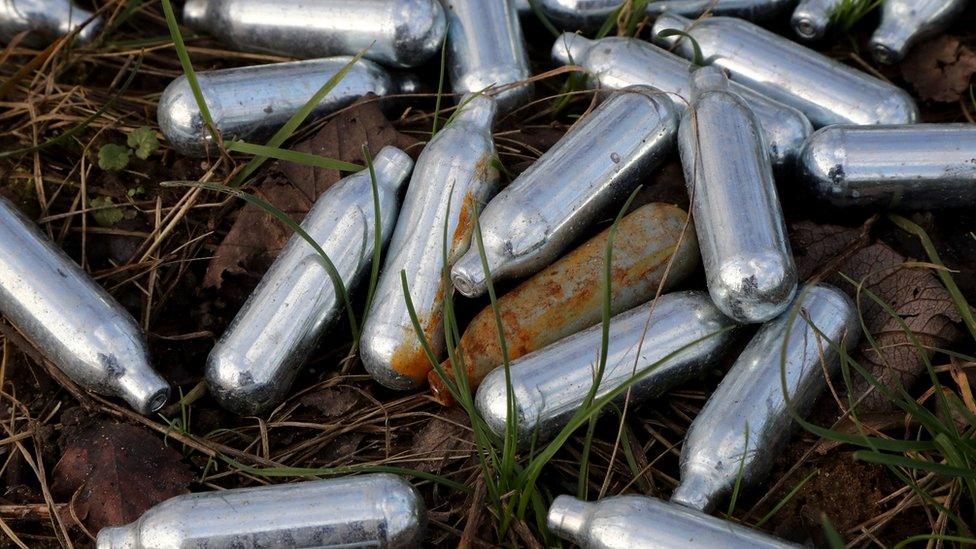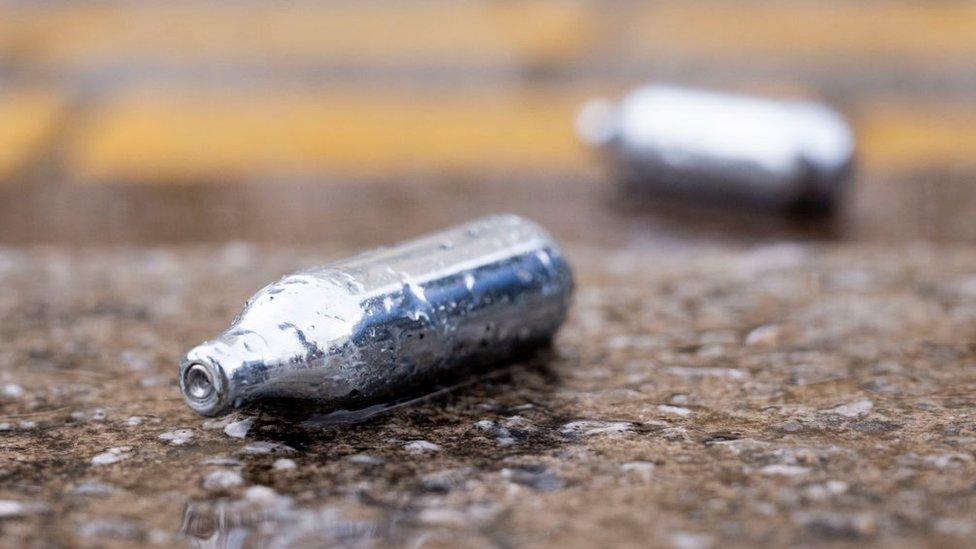Nitrous oxide: Southend mum over-the-moon about new law
- Published

Emma Cain, pictured with her son's prized acoustic guitar, was shocked to see youngsters inhaling laughing gas on a beach
A bereaved mum who warns youngsters about her son's death from solvent abuse said she was "in tears" of relief after laughing gas was banned.
Emma Cain's 17-year-old son, Jon, of Southend, Essex, died from a cardiac arrest in 2011, after inhaling butane.
Possessing nitrous oxide is to be made a criminal offence under new legislation, unconnected to butane misuse.
Miss Cain said she was "over the moon" about the new law.
She and her other children were at a beach last year for a memorial to Jon on what would have been his 28th birthday when they saw young people inhaling laughing gas.

Jon had auditioned for Britain's Got Talent three times and went to watch an X Factor live show with his mum, Emma
"My son had to explain to me they were inhaling gas from balloons and it broke my heart," she told BBC Essex.
"Ever since then I've been stopping them [youngsters] in the street, telling them not to do it, telling them about Jon.
"It's heartbreaking; I don't ever want a parent to go through what I've been through.
"I know it's not the same gas [as Jon inhaled] but you are playing Russian roulette with your life."
Miss Cain said she feared that after inhaling laughing gas, users would put themselves and others at risk, such as by driving or getting into fights.
On one occasion, Miss Cain challenged four people inhaling from baloons outside her home by showing them her son's ashes.
"There is risk of nerve damage [from nitrous oxide use] the lack of oxygen getting to the brain - it is dangerous," she added.

What are the risks of nitrous oxide?
Nitrous oxide slows down your brain and your body's responses
Too much can make you faint, lose consciousness, or suffocate
Chronic heavy use can also cause nerve damage
Inhaling directly from the canister is particularly dangerous - the gas is freezing cold and high pressure, which can damage the throat and lungs, stop breathing or slow the heart
It can also cause short-lived but intense feelings of paranoia

Butane, which is contained in aerosols, is the gas primarily associated with substance abuse in the UK and is not subject to the new laws.
It carries a far greater risk of fatality than nitrous oxide, an anaesthetic which is also one of the most-used drugs by UK 16 to 24-year-olds.

Nitrous oxide, sold in metal canisters, can lead to a vitamin deficiency that damages nerves in the spinal column
The ban on laughing gas is part of a £160m plan to tackle anti-social behaviour, homelessness, begging and graffiti.
The government said it was "concerned about the rise in health and social harms" of laughing gas, "particularly to young people".
During a visit to Chelmsford on Monday, Prime Minister Rishi Sunak said he would tackle the "scourge of drugs".
The independent Advisory Council on the Misuse of Drugs (ACMD) said nitrous oxide should be controlled not banned under the Misuse of Drugs Act 1971.

Find BBC News: East of England on Facebook, external, Instagram, external and Twitter, external. If you have a story suggestion email eastofenglandnews@bbc.co.uk, external
Related topics
- Published27 March 2023

- Published27 March 2023

- Published23 February 2023

- Published26 January 2023

- Published3 October 2022

- Published5 September 2022

- Published4 May 2022
